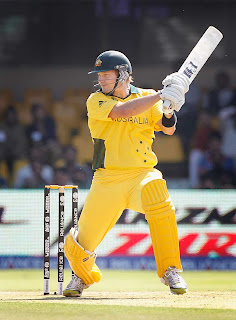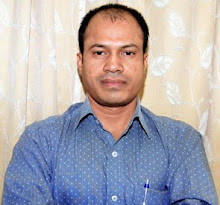 |
| shane watson |
AHMEDABAD: Zimbabwe looked good to chase Australia's total when Charles Coventry drove Brett Lee handsomely through the covers for four in the second over and then sent one soaring over the point fence for a flat six in the fourth. But once Lee caught a skier to dismiss Coventry off his own bowling in the sixth over of the match and Shaun Tait sent Brendan Taylor's middle stump for a walk in the 11th, it was curtains for Zimbabwe.
Chasing Australia's hard-earned 262-6, Zimbabwe were bundled out for 171 in the 47th over as Ponting's men recorded an easy 91-run win in their World Cup opener at Motera here on Monday. And like all the three top teams in the first two days of the World Cup, Australia too showed that teams like Kenya, Canada, Zimbabwe and even Bangladesh would be better off playing in a league of their own and not in the premier tournament in ICC's cricket calendar.
It was a good warm-up for the defending champions before their crucial Group-A game against arch-rivals New Zealand in Nagpur on February 25. They still have some work to do as far as their batting against spinners is concerned but this might be the attack Australia would like to stick to after all their experimentation in the ODI series against England post Ashes. Lee and Tait opening the bowling with Mitchell Johnson coming first change followed by Shane Watson and Jason Krejza looks more than a formidable attack. With spin likely to play a crucial part as the tournament progresses, the Aussies will still have Michael Clarke and the young Steven Smith waiting in the wings.
But the same can't be said about their batting, especially against the spinners. Their weakness against spin is one thing other teams would like to exploit as Zimbabwe did here. Starting with Ray Price's left-arm orthodox spin from one end, the Zimbabwe slow bowlers shared 41 overs, restricting the mighty Aussies to a little over 250.
It was a David vs Goliath contest alright but Zimbabwe did everything right on the field to give the defending champions a wake-up call after Ponting elected to bat, ignoring the dew factor. One could understand Watson and Brad Haddin's cautious approach in their first match of the mega event, but slowly they found themselves caught in the Zimbabwean spin web from which breaking free became an uphill task.
That the Aussies managed to score just 32 runs losing one wicket in their batting powerplay—from the 41st over when spin was on from either end—showed the kind of stranglehold the Zimbabwe spinners had on the Aussie batsmen.
The hallmark of the spinning operation was the length as the Zimbabwe bowlers kept the ball up inviting the drive against the slight hint of spin. The Australians batsman's reluctance to play the sweep shot meant that playing straight in the V would be a dangerous proposition. Haddin and Watson both found that out—caught plumb in front playing straight and forward.
Interestingly, both these dismissals were referred after they were turned down by Ashoka de Silva and Richard Kettleborough respectively.
----------------------
score card
| Australia innings (50 overs maximum) | R | M | B | 4s | 6s | SR | ||
| SR Watson | lbw b Cremer | 79 | 113 | 92 | 8 | 1 | 85.86 | |
| BJ Haddin† | lbw b Utseya | 29 | 68 | 66 | 3 | 0 | 43.93 | |
| RT Ponting* | run out (Mpofu) | 28 | 50 | 36 | 0 | 0 | 77.77 | |
| MJ Clarke | not out | 58 | 77 | 55 | 4 | 0 | 105.45 | |
| CL White | b Mpofu | 22 | 44 | 36 | 0 | 0 | 61.11 | |
| DJ Hussey | b Price | 14 | 15 | 8 | 1 | 1 | 175.00 | |
| SPD Smith | c Chakabva b Mpofu | 11 | 4 | 4 | 1 | 1 | 275.00 | |
| MG Johnson | not out | 7 | 5 | 3 | 1 | 0 | 233.33 | |
| Extras | (lb 7, w 7) | 14 | ||||||
| Total | (6 wickets; 50 overs; 191 mins) | 262 | (5.24 runs per over) | |||||
| Did not bat SW Tait, JJ Krejza, B Lee |
| Fall of wickets1-61 (Haddin, 18.5 ov), 2-140 (Watson, 31.2 ov), 3-144 (Ponting, 32.5 ov), 4-207 (White, 44.6 ov), 5-241 (Hussey, 48.1 ov), 6-254 (Smith, 49.1 ov) |
| Bowling | O | M | R | W | Econ | |||
| CB Mpofu | 9 | 0 | 58 | 2 | 6.44 | (2w) | ||
| RW Price | 10 | 0 | 43 | 1 | 4.30 | (1w) | ||
| P Utseya | 10 | 2 | 43 | 1 | 4.30 | (2w) | ||
| AG Cremer | 10 | 0 | 41 | 1 | 4.10 | (1w) | ||
| BRM Taylor | 3 | 0 | 23 | 0 | 7.66 | |||
| E Chigumbura | 2 | 0 | 18 | 0 | 9.00 | (1w) | ||
| SC Williams | 6 | 0 | 29 | 0 | 4.83 |
| Zimbabwe innings (target: 263 runs from 50 overs) | R | M | B | 4s | 6s | SR | ||
| BRM Taylor | b Tait | 16 | 53 | 24 | 1 | 0 | 66.66 | |
| CK Coventry | c & b Lee | 14 | 24 | 24 | 1 | 1 | 58.33 | |
| T Taibu† | c Watson b Johnson | 7 | 23 | 17 | 1 | 0 | 41.17 | |
| CR Ervine | lbw b Johnson | 0 | 13 | 6 | 0 | 0 | 0.00 | |
| E Chigumbura* | c †Haddin b Krejza | 14 | 44 | 25 | 2 | 0 | 56.00 | |
| SC Williams | c Watson b Tait | 28 | 40 | 40 | 1 | 1 | 70.00 | |
| RW Chakabva | lbw b Krejza | 6 | 21 | 18 | 0 | 0 | 33.33 | |
| P Utseya | c Ponting b Hussey | 24 | 52 | 45 | 1 | 0 | 53.33 | |
| AG Cremer | c †Haddin b Johnson | 37 | 51 | 51 | 4 | 0 | 72.54 | |
| RW Price | not out | 5 | 25 | 19 | 0 | 0 | 26.31 | |
| CB Mpofu | c †Haddin b Johnson | 2 | 12 | 11 | 0 | 0 | 18.18 | |
| Extras | (b 4, lb 9, w 3, nb 2) | 18 | ||||||
| Total | (all out; 46.2 overs; 190 mins) | 171 | (3.69 runs per over) | |||||
| Fall of wickets1-22 (Coventry, 5.4 ov), 2-40 (Taibu, 10.3 ov), 3-40 (Taylor, 11.2 ov), 4-44 (Ervine, 12.3 ov), 5-88 (Chigumbura, 21.2 ov), 6-96 (Williams, 24.6 ov), 7-104 (Chakabva, 27.2 ov), 8-153 (Utseya, 39.2 ov), 9-167 (Cremer, 42.4 ov), 10-171 (Mpofu, 46.2 ov) |
| Bowling | O | M | R | W | Econ | |||
| SW Tait | 9 | 1 | 34 | 2 | 3.77 | (1nb, 2w) | ||
| B Lee | 8 | 1 | 34 | 1 | 4.25 | (1nb, 1w) | ||
| MG Johnson | 9.2 | 2 | 19 | 4 | 2.03 | |||
| JJ Krejza | 8 | 0 | 28 | 2 | 3.50 | |||
| SR Watson | 3 | 0 | 7 | 0 | 2.33 | |||
| SPD Smith | 5 | 0 | 24 | 0 | 4.80 | |||
| DJ Hussey | 4 | 1 | 12 | 1 | 3.00 |



